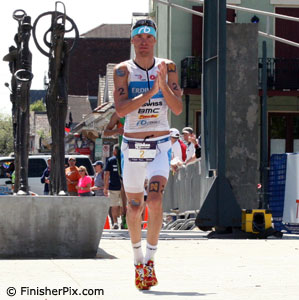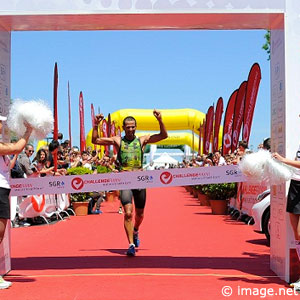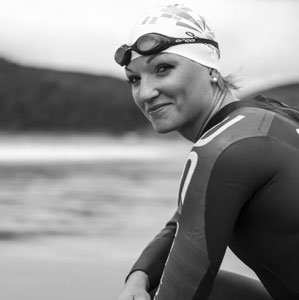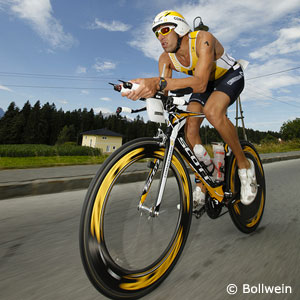Raelert, Csomor conquer Austria
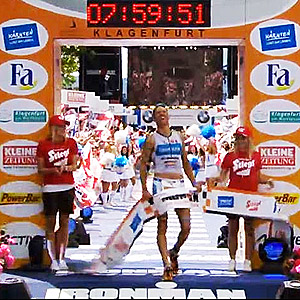
Ironman Austria is one of the sport’s two superspeedways where Ironman records are set and broken. In particular, Kärnten’s 2-loop bike course that roams this Alpine basin in southern Austria has two short, steep bike climbs followed by long gradual downhills – a topography perfect for faster bike times and very similar to the equally fast bike loops of Roth.
On the 15th anniversary of this early summer race in Kärnten, Andreas Raelert broke the 8 hour barrier and Erika Csomor the women’s 9 hour standard on their way to comfortable victories that still fell short of the very fastest days on this triathletic autobahn.
Raelert’s 7:59:51 was 11:45 better than runner-up Maik Twelsiek. One of the reasons Raelert’s path was smooth was the absence of six-time Ironman Austria champion Marino Vanhoenacker, who will be racing at Frankfurt next week. Lacking the incentive of a head-to-head matchup with the Belgian, Raelert was 13 minutes 53 seconds short of Vanhoenacker’s short-lived Ironman-distance world-best epic performance in 2011. Too bad for Kärnten spectators, but it's probably good for both men’s Ironman Hawaii ambitions as Raelert had plenty of capacity for a mutually destructive duel. As proof, Raelert’s 2011 race at Challenge Roth broke Vanhoenacker’s week-old mark with a still-standing Ironman-distance world-best time of 7:41:33. Still, Raelert’s 2013 mark stands as the 5th-fastest-ever men’s time at Kärnten, behind Peter Reid’s 1999 winning time of 7:51:34, Vanhoenacker’s 7:52:05 in 2010, and Michael Weiss’s runner-up 7:57:39 finish in 2011.
Erika Csomor of Hungary had more of a fight on her hands, as her 8:59:31 finish was a less comfortable 5:11 better than runner-up Asa Lundström of Sweden and fell 15:57 short of Mary Beth Ellis’ record 2011 performance. Csomor, whose race was only the 10th fastest women’s time on the Kärnten course, can take pride that her 2013 effort at age 39 was 12:32 faster than her winning performance in 2004 at age 30.
Men
Coming into this race, the elder Raelert brother had a decent start to the season with a 3rd place at Mallorca 70.3, a win at New Orleans 70.3 but then suffered a hiccup in early June when dental surgery just prior to the Challenge Kraichgau Half left him too weak to defend his title and ended in a survival slog to 21st place. Raelert, who was optimistic after 3 weeks recovery, had additional reason for confidence as 6-time champ Vanhoenacker and defending champion Faris Al-Sultan were not on the start list. Pre race speculation listed two-time Olympian and 2009 Ironman 70.3 World Championship silver medalist Daniel Fontana, super-cyclist and 2008 Ironman UK and Ironman 70.3 UK winner Philip Graves and equally super cyclist Maik Twelsiek as top threats.
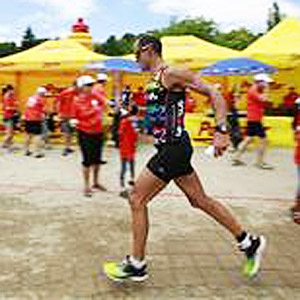
Before the pros hit the pristine waters of the Wörthersee, Fontana was a scratch, as was Estonian Marko Albert, leaving the field even more open to Raelert. By the end of the swim in 74 Fahrenheit alpine waters, Belgian Bart Colpaert blazed 1:45 in front with a swift 42:54 split, followed by Igor Amorelli of Brazil (44:21), Gergő Molnar of Hungary (44:22), Graves (44:23), Raelert (44:25), with Twelsiek 8th, 40 seconds back of the chasers in 45:05. David Plese of Slovenia, a formidable cyclist, was 4 minutes further back in 49:09.
Colpaert, whose best major finish was a 10th at Frankfurt, went flat out from the start of the bike, establishing a 2:06 margin on Raelert at kilometer 25.5, followed closely by Graves, Gergő Molnar and Amorelli. Twelsiek, who dropped back slightly, was 1:14 back of the chasers.
Halfway through the bike, Colpaert stretched his lead to 5:34 on the steady Raelert, while Twelsiek charged to within 3 seconds of his countryman. Franz Hofer of Austria, Graves, Jarmo Hast of Finland, Amorelli and Molnar formed a pack with 10 seconds of Raelert. By kilometer 142, things started to shake up. Colpaert’s lead was down to 3:39 over a tight pack consisting of David Plese, Georg Swoboda, Raelert, Graves, Amorelli and Jormo Hast.
Ten kilometers later, Colpaert’s lead was bleeding fast, as Twelsiek was the prime mover (+1:54) followed by Plese (+2:26), Swoboda (+2:28), Raelert (+2:29), Graves (+-2:32) and Amorelli (+2:34). At this point, Colpaert faded while Graves went on the attack, taking the lead into T2 at 5:14:03 into the race, followed by Twelsiek (+1:26), Plese (+3:35), Raelert (+3:46) Amorelli (+4:21), Swoboda (+4:29) and Colpaert (+5:18).
Sadly repeating his fate at Kärnten in 2012 when he dropped out after another fast bike split, Graves was not listed among the top 10 runners halfway through the run and did not finish the race. At 22k, Raelert made quick work of the field, trailed by Twelsiek (+6:55), Plese (+9:50) Swoboda (+13:16), Amorelli (+13:31) and Colpaert (+13:45). With 6 kilometers to go, Raelert led Twelsiek by 11:24, Plese by 17:11 and was cruising to a race-fastest 2:40:07 run which brought him to the finish in 7:59:31.
Twelsiek, who showed consistent promise with 14th, 12th and 12th place finishes at Kona from 2008 through 2010 which included second off the bike to Chris Lieto in 2009 and 2010, finished with a respectable, 4th-best 2:54:05 run to lock down the runner-up finish in 8:11:36. Twelsiek seems on the right path with another strong finish to go with a 2nd at Ironman St. George in 2012 and a 2nd to Craig Alexander at Ironman Coeur d’Alene in 2011.
Plese, whose previous best finishes were a 5th at Ironman Austria last year and a 4th at Ironman Florida, showed good progress under his coach Uros Velepec to make the final spot on the podium in an effort highlighted by his 2nd-fastest 4:25:49 bike split.
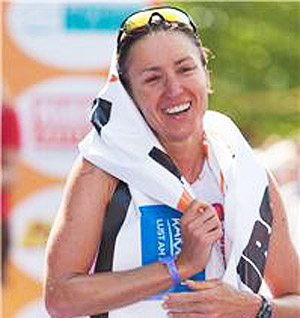
Women
After runner-up finishes in 2011 and 2012, Erika Csomor could be forgiven for entering her third straight Ironman Austria with confidence as 2011 winner Mary Beth Ellis and 2012 winner Linsey Corbin were not on the start line. While up and comers such as 2012 Ironman UK and Ironman 70.3 UK winner Eimear Mullan of Ireland and two Swedes — 2010 Powerman Zofingen 3rd place finisher Camilla Lindholm and 2012 Ironman Kalmar winner Asa Lundström — showed promise, the question facing the 39-year-old Hungarian was: Did she have another sparkling day to add to her already formidable resume?
Csomor has won a record seven victories at the classic Powerman Zofingen Duathlon, a silver at the 2007 ITU Long Distance Triathlon World Championship, a silver and a bronze at the 2001 and 2004 ITU Duathlon World Championships, and gold medals at the 2001, 2002 and 2004 ITU Duathlon World Championships. In addition, Csomor posted a sizzling fast 8:47:05 at Roth in 2008 and an 8:51:10 at Kärnten in 2011 – both of which were in runner-up efforts. On top of that, she placed 4th at Ironman Hawaii in 2008.
After fighting through injuries, she has come back strong in 2013 with wins at Challenge Rimini and Ironman Los Cabos, so her tank was clearly not empty.
After years of fighting her reputation as a duathlete with a slow swim, Csomor is no longer someone who must fight to break an hour. While 60-time Ironman finisher and swift swimmer Hillary Biscay and Keiko Tanaka of Japan came put of the Wörthersee in 49:11 and 49:12, contenders Eva Wutti of Austria (50:53), Lundström (51:49), Csomor (51:57) were not far off and Eimear Mullan (53:43) and Sarah Piampiano of the U.S. (53:58) were not out of the game either.
By 35 kilometers of the bike leg, Tanaka charged to a 1:14 lead over Diane McEwan of South Africa, 1:18 over Csomor, 2:21 on Piampiano, 2:50 over Lundström, 3:25 on Mullan and 3:26 on Biscay. By kilometer 152, Csomor took control with a 56 seconds lead on McEwan, 2:15 on Lundström, 4:39 on Mullan and 5:44 on Michaela Rudolf.
By the finish of the bike, Csomor’s proven bike skills were rewarded with a race-best 4:58:03 split that was 2:12 better than Lundström, 4:39 better than Mullan and 5:18 better than McEwan. Starting the run, Csomor had no reason to relax as her lead was just 1:49 lead on McEwan, 2:09 on Lundström and 6:21 on Mullan.
But halfway through the marathon, Csomor increased her lead on Lundström to 5:38 and on Mullan to 7:58 — effectively closing the door on the field barring a late race. By the finish, Csomor’s 3rd best 3:04:04 run brought her to the finish in 8:59:31 with a 5:11 margin on runner-up Lundström and 6:15 on Mullan, who closed with a 2nd-best 3:03:53 run. Sarah Piampiano’s women’s-best 3:02:12 run brought her home 4th 1:44 behind Mullan.
Looking ahead
In the history of excellent June-July performances at Kärnten, Frankfurt and Roth, wins and records don’t usually translate to wins at Kona. On the men’s side, Peter Reid got 2nd to Luc van Lierde at Kona in 1999 after a win at Austria. On the women’s side, Chrissie Wellington broke the mold after her wins at Frankfurt in 2008 and Roth in 2009 were followed by wins at Kona. And so did Paula Newby-Fraser find her win at Ironman Europe in Roth was no bad luck at Ironman Hawaii in 1992. But as a rule of thumb, Kona winners save their best for the Big One in October. Still, Andreas Raelert’s solid showing at Kärnten today seems like a good omen that his string of four straight podium finishes at Kona might well reach five. As for Csomor, her dream of reaching the Kona podium before she turns 40 this winter seems quite alive as well.
Ironman Austria
Kärnten, Austria
June 30, 2013
S 2.4 mi. / B 112 mi. / R 26.2 mi.
Results
Men
1. Andreas Raelert (GER) 7:59:51
2. Maik Twelsiek (GER) 8:11:36
3. David Plese (SLO) 8:19:13
4. Jarmo Hast (FIN) 8:20:32
5. Igor Amorelli (BRA) 8:21:37
6. Bart Colpaert (BEL) 8:26:17
7. Georg Swoboda (AUT) 8:27:25
8. Vincent Riess (AUT) 8:27:50
9. Petr Vabrousek (CZE) 8:29:34
10. Thiago Vinhal (BRA) 8:30:01
Women
1. Erika Csomor (HUN) 8:59:31
2. Asa Lundström (SWE) 9:04:42
3. Eimear Mullan (IRL) 9:05:46
4. Sarah Piampiano (USA) 9:07:30
5. Camilla Lindholm (SWE) 9:16:18
6. Simone Helfenschneider-Ofner (AUT) 9:19:36
7. Keiko Tanaka (JPN) 9:24:39
8. Elisabeth Gruber (AUT) 9:26:15
9. Michaela Rudolf (AUT) 9:30:37
10. Hillary Biscay (USA) 9:36:03


